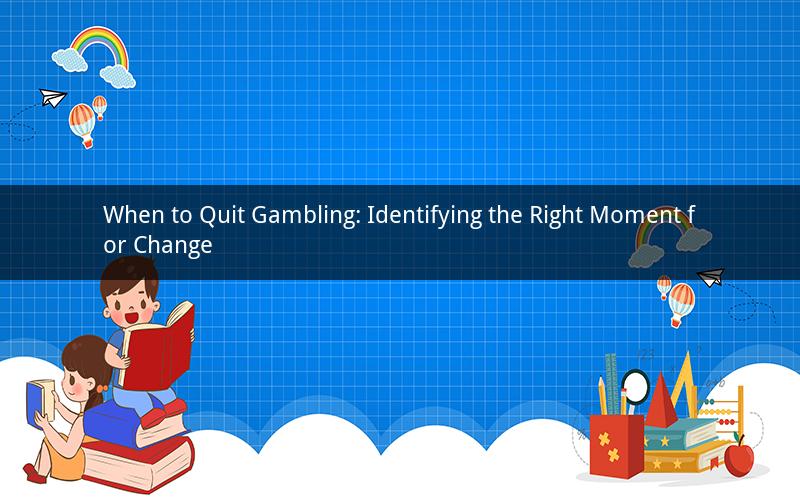
Introduction:
Gambling has the potential to be both an enjoyable pastime and a dangerous addiction. For many, the line between the two can blur, leading to serious consequences. Knowing when to quit gambling is crucial for those struggling with an unhealthy relationship with this activity. This article explores the signs that indicate it's time to take a break from gambling and the steps to take for a successful recovery.
Signs It's Time to Quit Gambling:
1. Financial Strain:
One of the most obvious signs that it's time to quit gambling is when it starts to negatively impact your financial stability. If you find yourself constantly chasing losses, borrowing money, or falling into debt, it's a clear indicator that your gambling habits are out of control.
2. Emotional and Psychological Distress:
Gambling addiction can lead to emotional and psychological distress. If you're experiencing feelings of anxiety, depression, guilt, or frustration due to your gambling habits, it's a sign that it's time to seek help.
3. Relationship Issues:
Gambling addiction can strain relationships with family, friends, and loved ones. If you're neglecting your responsibilities and causing harm to those around you due to your gambling, it's time to reconsider your priorities.
4. Legal and Professional Consequences:
If your gambling habits have led to legal or professional repercussions, such as losing your job or facing legal action, it's a strong indication that it's time to quit.
5. Physical Health Issues:
Gambling addiction can also have negative effects on your physical health. If you're experiencing sleep disturbances, loss of appetite, or other physical symptoms due to your gambling, it's time to take a step back.
Steps to Quit Gambling:
1. Acknowledge the Problem:
The first step in quitting gambling is to admit that you have a problem. This may involve seeking help from a professional or confiding in someone you trust.
2. Set Realistic Goals:
Set achievable goals for yourself, such as limiting the amount of money you spend on gambling or the number of days you go without gambling.
3. Develop a Support System:
Surround yourself with supportive friends, family, or professionals who can help you through the recovery process. Joining a support group like Gamblers Anonymous can also be beneficial.
4. Create a Plan:
Develop a plan to avoid triggers and temptations that may lead you back to gambling. This may include avoiding certain places or situations that make you want to gamble.
5. Seek Professional Help:
If you're struggling to quit gambling on your own, consider seeking help from a therapist or counselor specializing in addiction. They can provide guidance, support, and coping strategies to help you overcome your addiction.
Frequently Asked Questions:
1. How do I know if I have a gambling addiction?
You may have a gambling addiction if you experience an overwhelming urge to gamble, feel a sense of euphoria while gambling, and experience negative consequences as a result of your gambling.
2. Can I quit gambling on my own?
It's possible to quit gambling on your own, but it can be challenging. Seeking support from friends, family, or professionals can increase your chances of success.
3. How long does it take to recover from a gambling addiction?
The duration of recovery varies from person to person. Some individuals may experience immediate relief, while others may need ongoing support and treatment.
4. Can I still enjoy gambling if I have an addiction?
If you have a gambling addiction, it's best to avoid gambling altogether. Engaging in any form of gambling can trigger your addiction and lead to relapse.
5. What if I relapse after quitting gambling?
Relapse is a common part of the recovery process. If you relapse, it's important to learn from the experience and seek additional support to help you overcome your addiction.
Conclusion:
Recognizing when to quit gambling is essential for those struggling with an unhealthy relationship with this activity. By identifying the signs of a gambling addiction and taking proactive steps to address it, individuals can work towards a healthier, more fulfilling life. Remember, seeking help is a sign of strength, and there are resources available to support you on your journey to recovery.